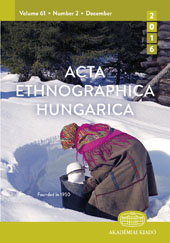Wolf holidays among Southern Slavs in the Balkans
Wolf holidays among Southern Slavs in the Balkans
Author(s): Mirjam MencejSubject(s): Customs / Folklore, Metaphysics, Ethnohistory, Sociology of Religion, History of Religion
Published by: Akadémiai Kiadó
Keywords: wolves; wolf holidays; St. Martin; St. Sava; folk calendar; summer-winter opposition;
Summary/Abstract: The article discusses wolf holidays among Southern Slavs in the Balkans. They are celebrated for a period of 3–11 days, most often around St. Mrata’s day, in Serbia also around St. Sava and more seldom around Archangel Michael’s day. During the holidays many prohibitions are observed and many acts performed and the chief purpose of all of them is to protect the livestock (and people) from wolves. People symbolically shut the jaws of wolves, do not work with the livestock or animal products, do not knit or spin, do not go into the woods, do not mention wolves or use other names for them, etc. The last day of these holidays is believed to be especially dangerous as this is the day when the “lame wolf” is supposed to move. The paper demonstrates that these taboos, folk beliefs and practice can only be understood on the basis of folk beliefs related to the Master of wolves and more specifically legends about the Master of wolves who gives out food to wolves on his name day.
Journal: Acta Ethnographica Hungarica
- Issue Year: 54/2009
- Issue No: 2
- Page Range: 337-358
- Page Count: 22
- Language: English
- Content File-PDF

